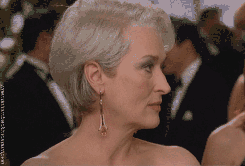 There are a number of cringeworthy phrases in the English language. My carefully cultivated list of most annoying expressions ranges from corporate guff such as “move the needle” (what does that even mean?) to everyday sentence-starters such as “to tell you the truth” (why is this necessary – do you usually lie?). While these phrases are mildly aggravating, there’s one that practically sends me into a state of convulsions: “Anything But Chardonnay“.
There are a number of cringeworthy phrases in the English language. My carefully cultivated list of most annoying expressions ranges from corporate guff such as “move the needle” (what does that even mean?) to everyday sentence-starters such as “to tell you the truth” (why is this necessary – do you usually lie?). While these phrases are mildly aggravating, there’s one that practically sends me into a state of convulsions: “Anything But Chardonnay“.
I’ve been wanting to dedicate a blog post to this glorious grape for a while; hearing someone utter the dreaded “ABC” phrase (even the acronym is annoying) last week was just the catalyst I needed to justify a pro-Chardonnay-rampage.
I think Chardonnay is a wonderful grape varietal and I’m not ashamed to admit it. If you asked me to choose my favourite grape of all time while holding a .44 magnum to my head, I’d pick Chardonnay. Not because it’s probably the easiest name to pronounce (although that is a plus – you try saying Gewürztraminer in a loud bar) but because of its adaptability.
It is possibly the most versatile grape in the entire wine world. It is responsible for…
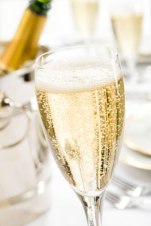 (1) Champagne. Chardonnay is one of the three permitted grape varieties in Champagne (the other two are Pinot Noir and Meunier). Most Champagnes are a blend of the three grapes as each has its own unique characteristics: Chardonnay contributes freshness and acidity, Pinot Noir tends to provide body and structure, and Meunier offers fruity, aromatic flavours. If you look hard enough, you can find “Blanc de Blancs” Champagne which is comprised exclusively of Chardonnay. Due to the relatively cool climate in the region, the Chardonnay grapes don’t tend to ripen fully which is why they don’t develop the aromas and flavours as they would in other regions (read: not all Chardonnays are the same!).
(1) Champagne. Chardonnay is one of the three permitted grape varieties in Champagne (the other two are Pinot Noir and Meunier). Most Champagnes are a blend of the three grapes as each has its own unique characteristics: Chardonnay contributes freshness and acidity, Pinot Noir tends to provide body and structure, and Meunier offers fruity, aromatic flavours. If you look hard enough, you can find “Blanc de Blancs” Champagne which is comprised exclusively of Chardonnay. Due to the relatively cool climate in the region, the Chardonnay grapes don’t tend to ripen fully which is why they don’t develop the aromas and flavours as they would in other regions (read: not all Chardonnays are the same!).
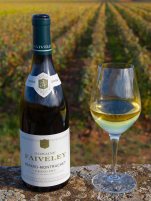 (2) Some of the most expensive white wines in the world. Grand Cru vineyards in Burgundy – such as Bâtard-Montrachet and Le Montrachet – produce white wines with the biggest price tags in the world. If you look at a list of the most expensive white wines sold in history, Chardonnay absolutely dominates with bottles selling for multiple thousands of dollars. In August I had the chance to walk through some of these acclaimed vineyards, which was great fun (albeit a bit depressing given all of the wines were out of my budget). These big price tags aren’t limited to Burgundy – Chardonnays from certain vineyards in Napa and Sonoma (California) can set you back a few hundred too.
(2) Some of the most expensive white wines in the world. Grand Cru vineyards in Burgundy – such as Bâtard-Montrachet and Le Montrachet – produce white wines with the biggest price tags in the world. If you look at a list of the most expensive white wines sold in history, Chardonnay absolutely dominates with bottles selling for multiple thousands of dollars. In August I had the chance to walk through some of these acclaimed vineyards, which was great fun (albeit a bit depressing given all of the wines were out of my budget). These big price tags aren’t limited to Burgundy – Chardonnays from certain vineyards in Napa and Sonoma (California) can set you back a few hundred too.
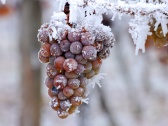 (3) Dessert wine. Chardonnay grapes are sometimes used in the production of eiswein (ice wine) – a type of dessert wine that involves freezing the grapes on the vine. Chardonnay can also be used to make late harvest wines – a type of dessert wine whereby the winemaker picks the grapes much later than usual (in fact, the grapes often end up looking more like raisins!). Because of the way the grapes are harvested, these Chardonnay-based dessert wines are deeply concentrated, lusciously sweet and rich in flavour. It sometimes feels like you’re drinking liquid gold! Granted, the Chardonnay grape doesn’t have to be used – Riesling is a top choice – but it can be used which is testament to its versatility as a grape.
(3) Dessert wine. Chardonnay grapes are sometimes used in the production of eiswein (ice wine) – a type of dessert wine that involves freezing the grapes on the vine. Chardonnay can also be used to make late harvest wines – a type of dessert wine whereby the winemaker picks the grapes much later than usual (in fact, the grapes often end up looking more like raisins!). Because of the way the grapes are harvested, these Chardonnay-based dessert wines are deeply concentrated, lusciously sweet and rich in flavour. It sometimes feels like you’re drinking liquid gold! Granted, the Chardonnay grape doesn’t have to be used – Riesling is a top choice – but it can be used which is testament to its versatility as a grape.
(4) A huge array of different wine styles. Dessert wine aside, the Chardonnay grape results in a tremendous variety of styles of wine. It can range from the crisp and steely Chablis, to the oak-aged butter-in-the-glass wines from Burgundy and California, to the ripe tropical “pineappley” wines from warm climate regions of the New World. What I’m trying to illustrate is that Chardonnay is so incredibly adaptable that you’d have to taste a worrying amount of wine to credibly decide that Chardonnay is rubbish.
I’m not arguing that every single bottle of Chardonnay in the world is great. There are some pretty shocking ones out there, but that’s more a function of the way the wine has been produced rather than the grapes it has been produced from.
I heard a great analogy the other day. According to Winebird, “Chardonnay is the wine version of the name ‘Kate’: the number of styles you find worldwide makes it difficult to pin down your thoughts on it but it’s actually responsible for making some of the finest white wine on the planet”.
So next time you hear someone slander this great grape, remind them that the world would be a pretty bleak place without it.
Grapeful is a free app that helps you pair food with wine, and much more. Visit www.grapefulapp.com or download it directly from the Apple App Store and the Google Play Store.
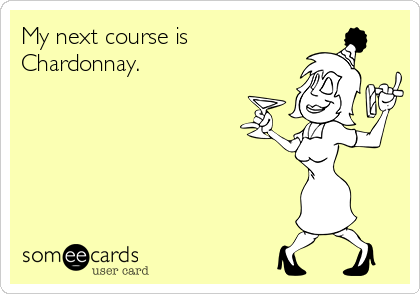
I agree entirely. A common trick to confuse the ABC brigade is to say “oh, you don’t want Chardonnay; no worries I’ll get you a glass of Chablis…” They then tell you how much they like the wine and you then get the satisfaction of telling them that they’ve just drunk a Chardonnay. Works every time!
I bet the look on their face is priceless. I will do that next time, thanks for the tip!